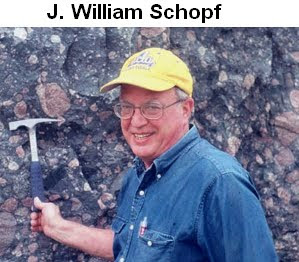NCSE is delighted to congratulate J. William Schopf on receiving the Paleontological Society Medal, the most prestigious honor bestowed by the Paleontological Society, on November 4, 2012, at the Geological Society of America's annual meeting. A life member of NCSE, Schopf is Professor of Paleobiology in the Department of Earth and Space Sciences at the University of California, Los Angeles, and the author of Cradle of Life: The Discovery of Earth's Earliest Fossils (Princeton University Press, 1999). Previous recipients of the medal include NCSE Supporters Niles Eldredge, Stephen Jay Gould, and Malcolm C. McKenna.I'm quite surprised by this award since Schopf's main claim to fame is the discovery of fossil cyanobacteria in Australian deposits that date back 3.45 billion years. These "fossils" are definitely not cyanobacteria and they most likely aren't even fossils [Did Life Arise 3.5 Billion Years Ago?.
Does anyone know more about this award? Does the paleontological society still believe that these "fossils" are actually ancient bacteria or was the medal awarded for some other contribution to paleontology?








